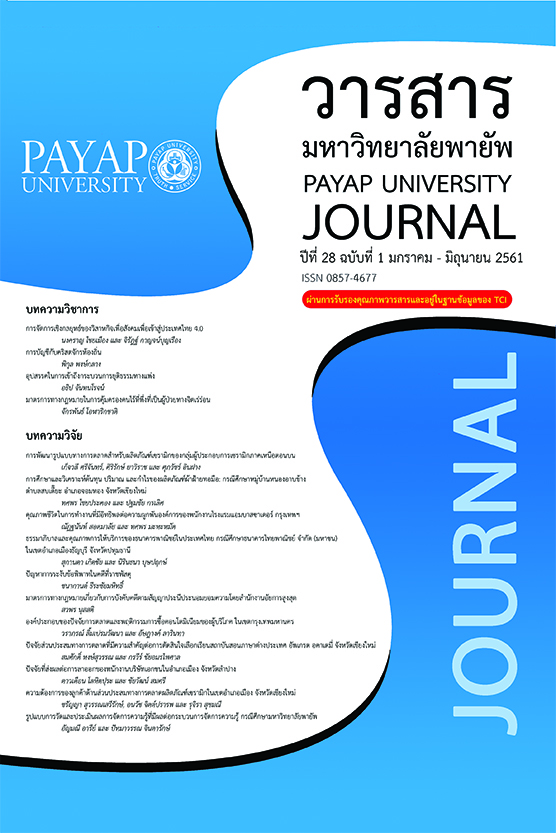มาตรการทางกฎหมายเกี่ยวกับการบังคับคดีตามสัญญาประนีประนอม ยอมความโดยสำนักงานอัยการสูงสุด
Main Article Content
บทคัดย่อ
การอยู่ร่วมกันของมนุษย์ย่อมต้องมีข้อพิพาทเกิดขึ้นระหว่างสมาชิกในชุมชนหรือสังคม ซึ่งส่งผลกระทบต่อความเป็นอยู่ของสมาชิกที่พิพาทนั้นโดยตรงหรือบางข้อพิพาทที่รุนแรงอาจจะส่งผลกระทบต่อความสงบสุขเรียบร้อยในสังคมส่วนรวมด้วย ซึ่งในแต่ละประเทศต่างก็มีหน่วยงานที่รับผิดชอบดูแลในด้านการไกล่เกลี่ยประนอมข้อพิพาทในสังคม โดยมีกฎหมายรองรับแตกต่างกัน ทั้งในด้านหลักเกณฑ์ บุคลากร ที่ทำหน้าที่ในการไกล่เกลี่ยประนอมข้อพิพาท รวมตลอดถึงผลของการประนอมข้อพิพาทในแต่ละรูปแบบของแต่ละหน่วยงาน
บทความวิชาการเรื่องนี้มีวัตถุประสงค์ที่จะศึกษาปัญหาทางกฎหมายในการบังคับคดีตามสัญญาประนีประนอมยอมความ ในกรณีคู่กรณีพิพาททำการไกล่เกลี่ยประนีประนอมยอมความชั้นพนักงานอัยการแล้วไม่ปฏิบัติตามสัญญาประนีประนอมยอมความ เปรียบเทียบกับการไกล่เกลี่ยข้อพิพาทนอกศาลของกระทรวงมหาดไทย โดยพนักงานฝ่ายปกครอง (อำเภอ) ตลอดจนแนวทาง และข้อเสนอแนะให้มีการเพิ่มเติม ปรับปรุง แก้ไขตามกฎหมายที่มีอยู่ สำหรับรองรับการบังคับคดีตามสัญญาประนีประนอมยอมความในกรณีคู่กรณีพิพาททำการไกล่เกลี่ยประนีประนอมยอมความชั้นพนักงานอัยการ โดยให้มีผลเป็นเช่นเดียวกันกับสัญญาประนีประนอมยอมความของพนักงานฝ่ายปกครองระดับอำเภอ กล่าวคือ ทำให้สัญญาประนีประนอมยอมความของคู่กรณีที่ยุติข้อพิพาทโดยพนักงานอัยการ สำนักงานอัยการสูงสุดมีสภาพบังคับทางกฎหมาย โดยหากคู่กรณีฝ่ายใดฝ่ายหนึ่งตามสัญญานั้นไม่ปฏิบัติตามข้อตกลงในสัญญา ให้คู่กรณีอีกฝ่ายหนึ่งสามารถร้องต่อพนักงานอัยการเพื่อยื่นคำร้องต่อศาลที่มีเขตอำนาจ เพื่อให้ศาลออก คำบังคับตามสัญญาประนีประนอมยอมความเช่นเดียวกัน โดยมิต้องนำสัญญาประนีประนอมยอมความนั้นไปฟ้องร้อง ต่อศาลก่อนดังเช่นสัญญาประนีประนอมยอมความทางแพ่งอื่น ๆ ที่คู่กรณีได้ไปทำข้อตกลงกันโดยทั่ว ๆ ไป
Article Details
เอกสารอ้างอิง
นพพร โพธิรังสิยากร. (2552). ปัญหาข้อกฎหมายเกี่ยวกับการจัดการความขัดแย้งด้วยการไกล่เกลี่ย. เอกสารวิชาการส่วนบุคคลหลักสูตร “ผู้บริหารกระบวนการยุติธรรมระดับสูง (บ.ย.ส.)” รุ่นที่ 12 วิทยาลัยการยุติธรรม สำนักงานศาลยุติธรรม.
บุญตา ส. ผาบมีชัย (2547). กระบวนการว่าด้วยการไกล่เกลี่ยข้อพิพาทศึกษา: เปรียบเทียบความกฎหมายไทยและสาธารณประชาธิปไตยประชาชนลาว. วิทยานิพนธ์นิติศาสตรมหาบัณฑิต สาขาวิชากฎหมายมหาชน. มหาวิทยาลัยธรรมศาสตร์, กรุงเทพฯ.
วงศ์วศิษฏ์ วรกิจโสภณไพศาล. (2552). ปัญหากฎหมายเกี่ยวกับการไกล่เกลี่ยข้อพิพาททางแพ่ง ก่อนเสนอคดีต่อศาล. วิทยานิพนธ์นิติศาสตรมหาบัณฑิต สาขาวิชากฎหมายมหาชน. มหาวิทยาลัยศรีปทุม วิทยาเขตชลบุรี, กรุงเทพฯ.
วรกฤช นิ่งน้อย. (2543). การอำนวยความเป็นธรรม: ศึกษาเฉพาะกรณีการระงับข้อพิพาทของประชาชนโดยฝ่ายปกครอง อำเภอเมืองสมุทรสาคร จังหวัดสมุทรสาคร. วิทยานิพนธ์ศิลปศาสตรมหาบัณฑิต สาขาวิชาการบริหารงานยุติธรรม. กรุงเทพฯ: มหาวิทยาลัยธรรมศาสตร์.
สรวิศ ลิมปรังษี. (2545). อนุญาโตตุลาการตามกฎหมายใหม่กับการระงับข้อพิพาท. กรุงเทพฯ: นิติรัฐ.
สำนักงานอัยการสูงสุด. (2547). คู่มือประนอมข้อพิพาท. กรุงเทพฯ: ชวนพิมพ์.


